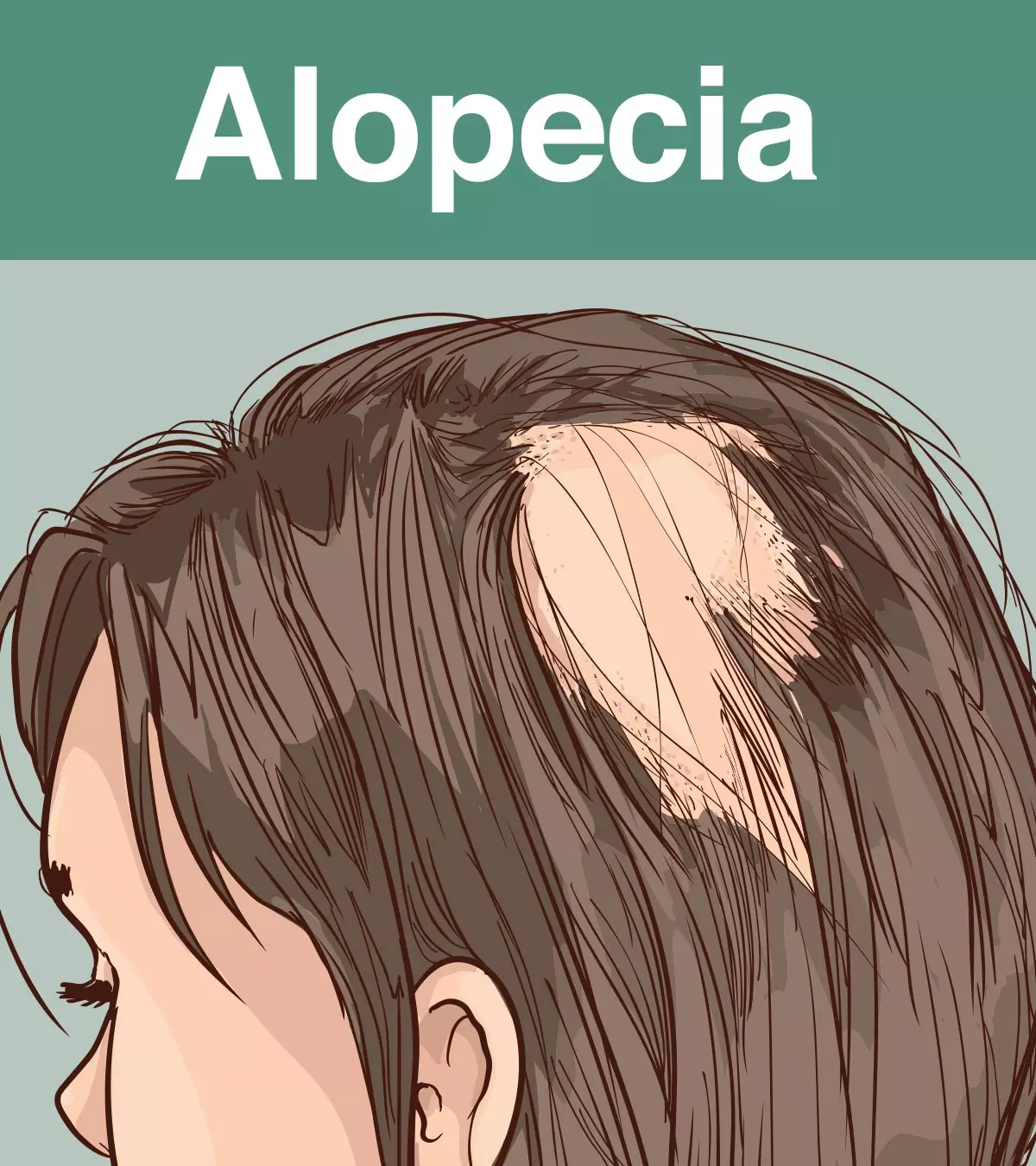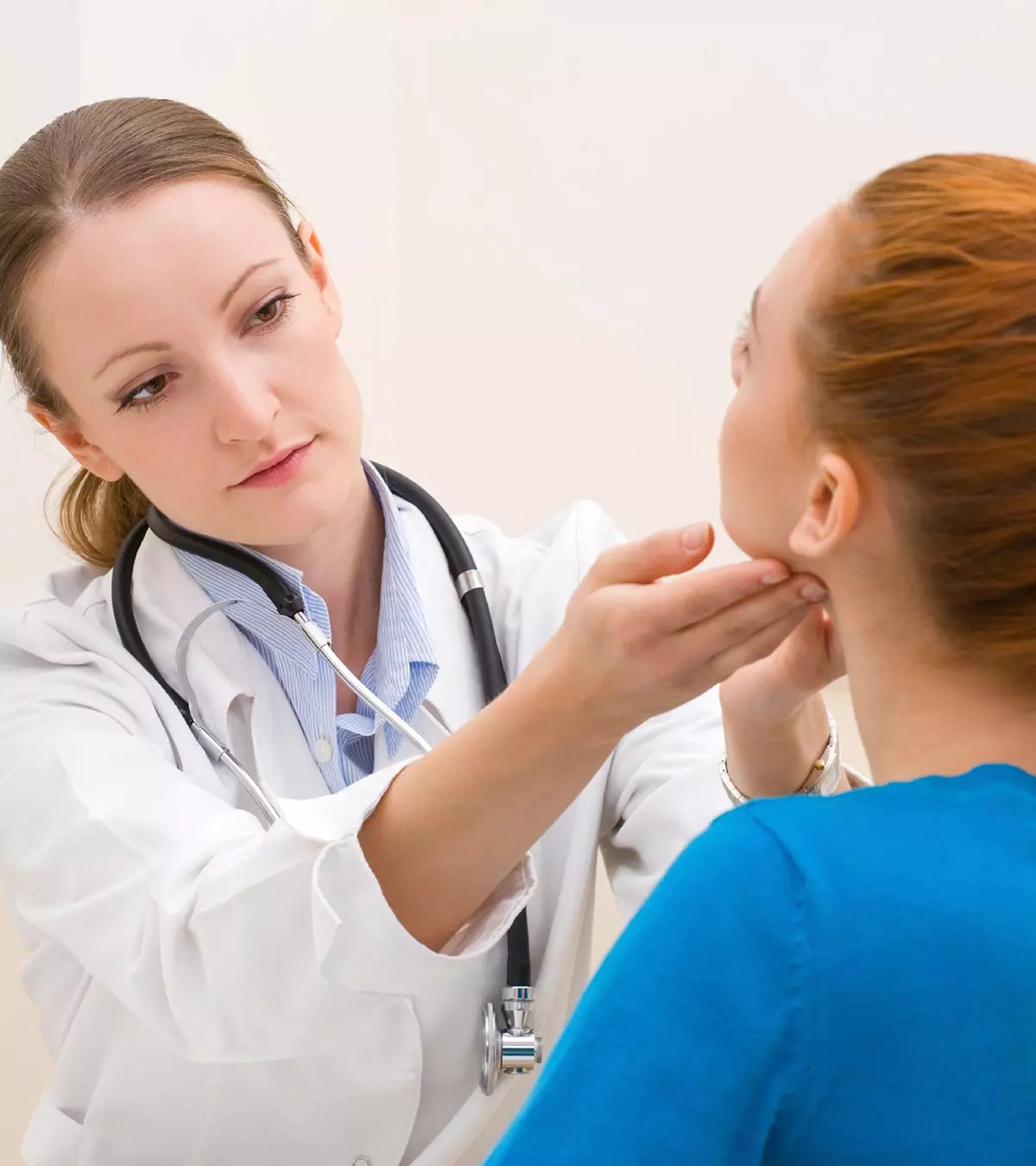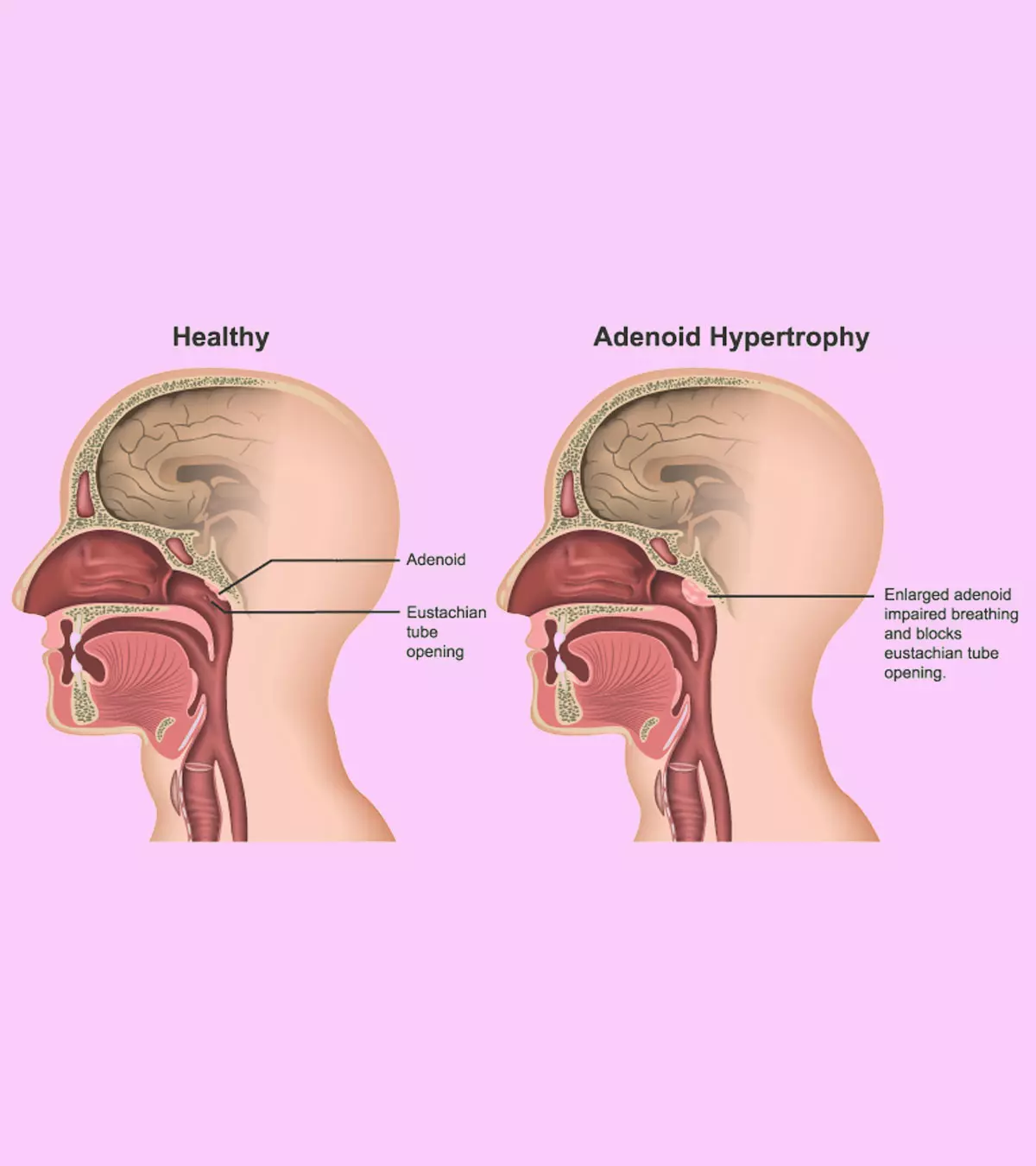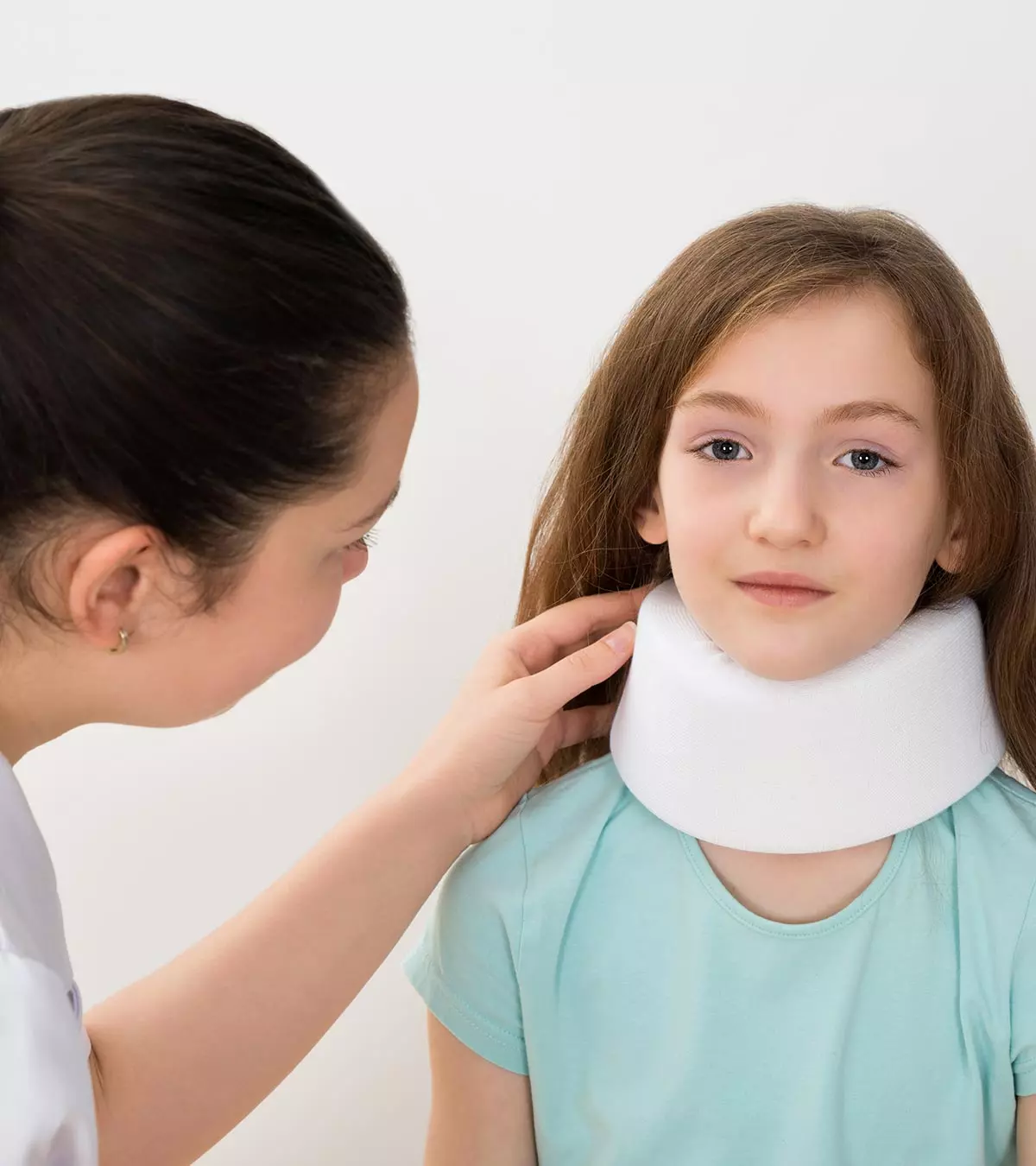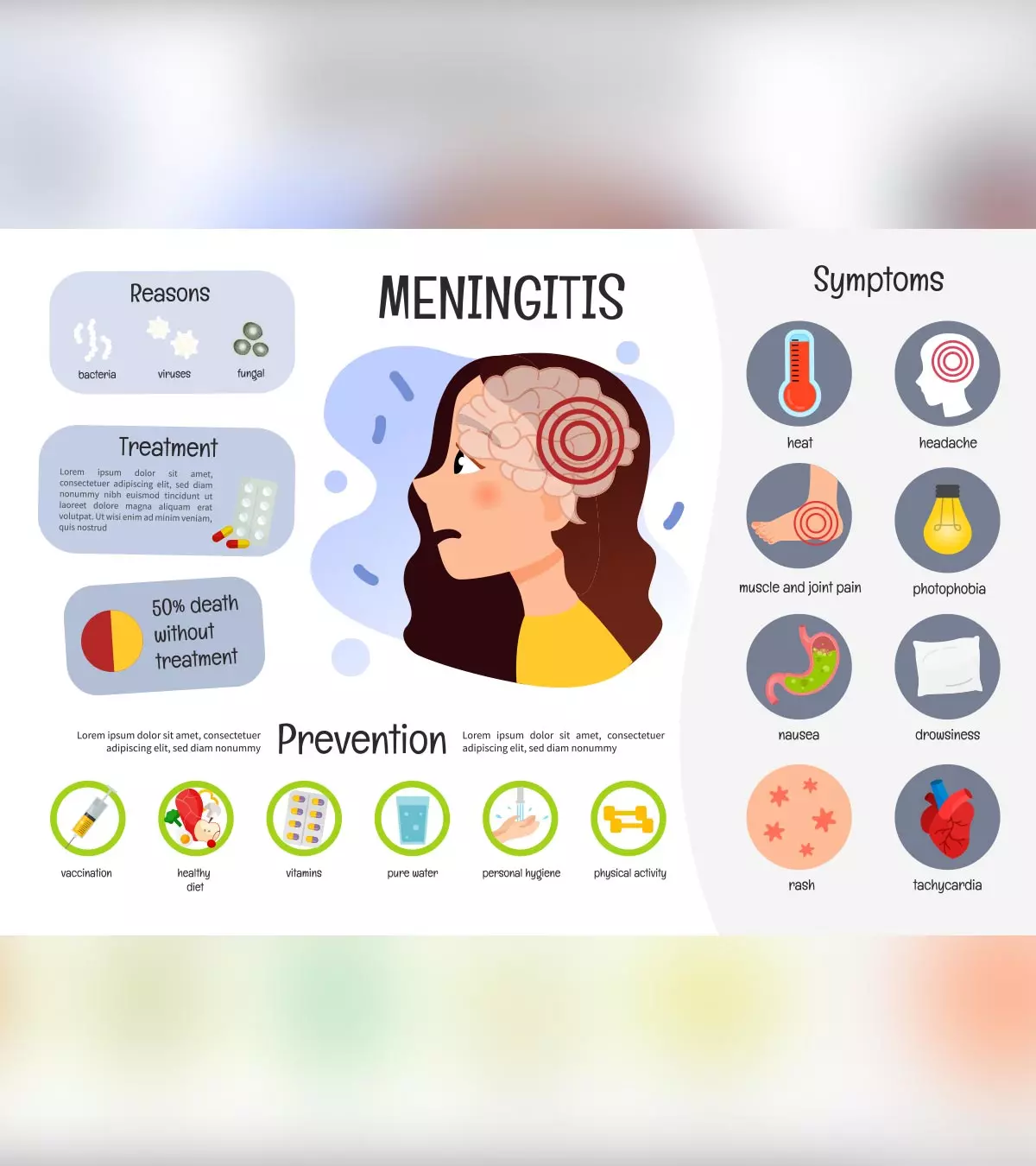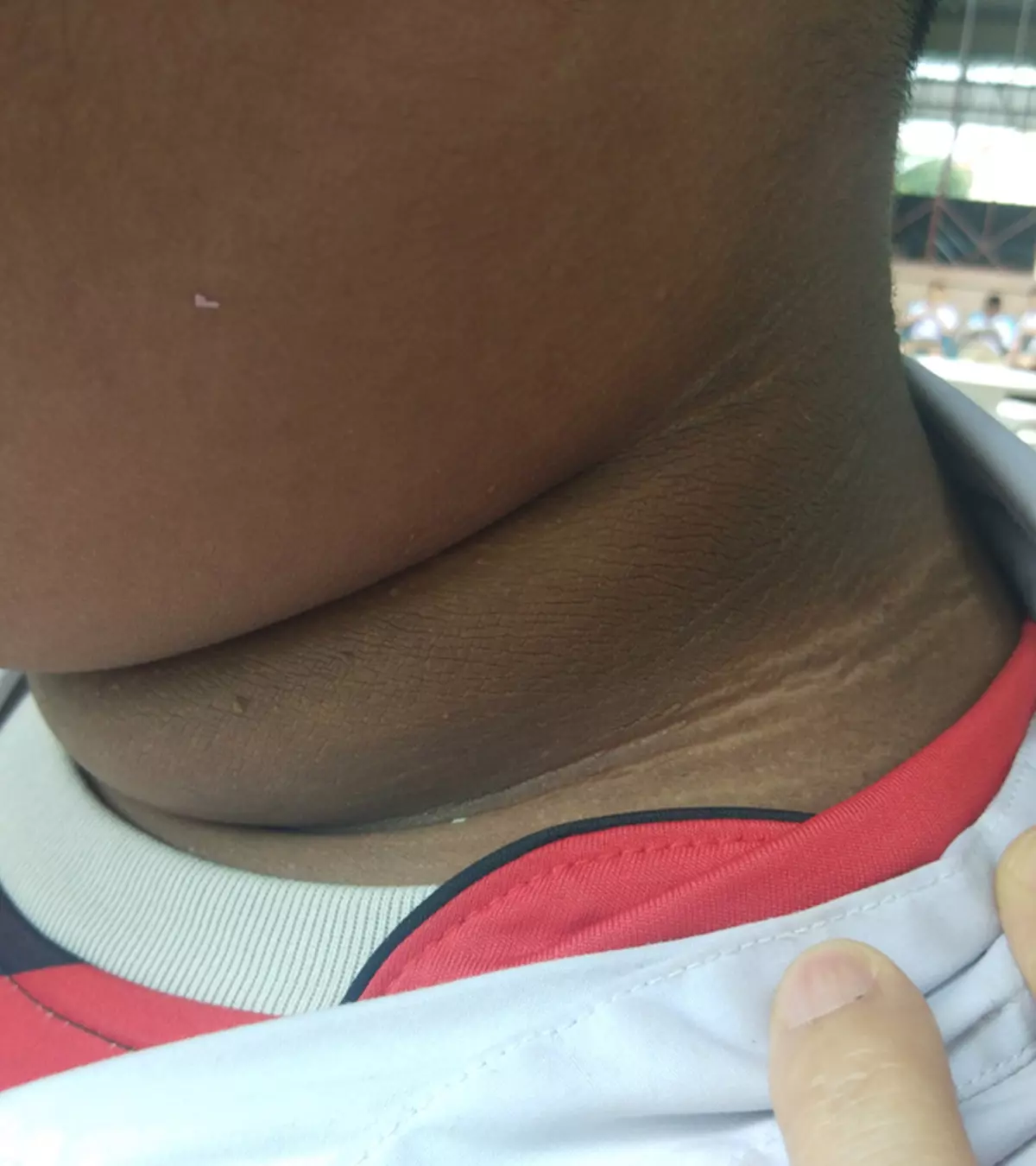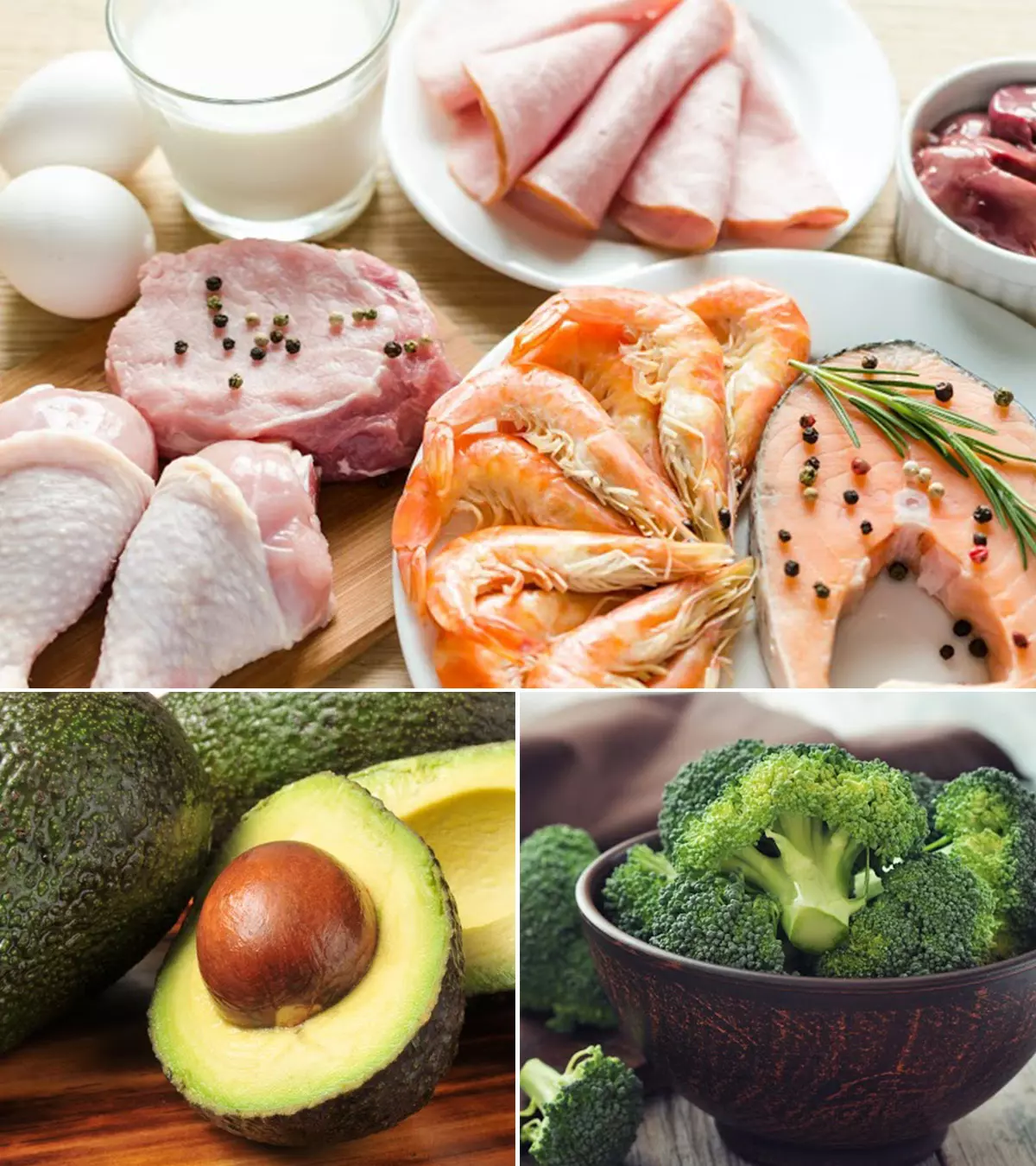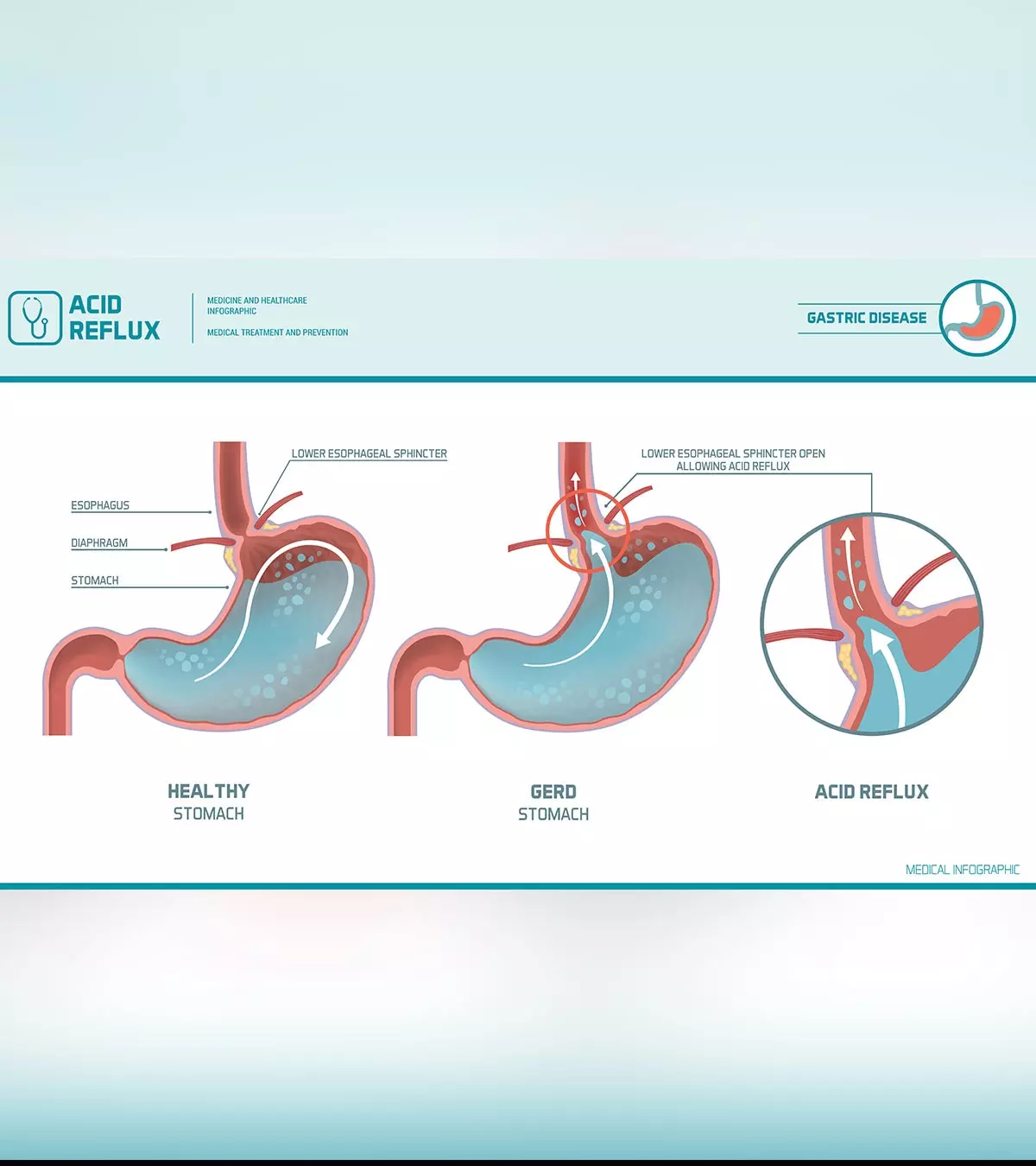
Image: ShutterStock

Acid reflux in teens is common, and it occurs when the stomach contents come back or regurgitate into the esophagus. It is also called acid indigestion or gastroesophageal reflux (GER) and is more prevalent in children and teens between two and 19 years (1). A study conducted by researchers from Columbia University Irving Medical Center, New York reveals that gastroesophageal reflux disease (GERD) is prevalent in about 10% of children who are older than 10 years. In case of acid reflux, the esophagus lining gets irritated with stomach acid, and it can cause problems later on.
Although occasional acid reflux and heartburn are normal, frequent acid reflux can result from health problems requiring medical care. Diagnosis of gastroesophageal reflux disease (GERD) is often made in teens with severe, long-lasting acid reflux. Usually, acid reflux more than two times a week for subsequent weeks could be GERD (1) (2).
Read on to know the causes, symptoms, and treatments for acid reflux in teens.
Key Pointers
- Acid reflux may occasionally occur in teens, but recurrent regurgitation of stomach contents or GERD indicates underlying health conditions.
- Symptoms may vary with age and include nausea, vomiting, regurgitation, and heartburn.
- The associated complications may include esophagitis, esophageal stricture, and respiratory issues.
- The condition may be managed with lifestyle modification, certain medications, and some simple home remedies.
Is It Normal For A Teenager To Have Acid Reflux?
GER is commonly observed in children and teens. However, it doesn’t mean they have GERD. Although around 25% of teens experience GERD symptoms, it is more common in adults (1).
Signs And Symptoms Of Acid Reflux In Teens

The signs and symptoms of GERD or acid reflux in children and teens may vary depending on their age. The common symptoms include (1) (3) (4):
- Heartburn: Children with GERD who are younger than 12 years may not experience heartburn. On the other hand, children who are 12 or older may experience heartburn regularly due to acid reflux. Heartburn is described as a feeling of burning and pain in the middle of the abdomen, central part of the chest, and behind the breastbone.
- Foul or bad breath
- Nausea
- Frequent regurgitation
- Vomiting
- Hoarseness
- Difficulty in swallowing
- Chest pain
- Heartburn or abdominal pain
- Belching
- Hiccups
- Pain while swallowing
- Dental erosion or wearing away of teeth
- Breathing problems: Teens with GERD may breathe stomach acid into their lungs, resulting in irritation in the throat and lungs. These respiratory problems may include persistent coughing, sore throat, chest congestion, wheezing, or recurrent pneumonia.
Articulating her symptoms when dealing with GERD during her teenage years, blogger Danie Roberts says, “Even though I didn’t get diagnosed until I was in college, I had experienced symptoms starting when I was 11 or 12. It was when I was seeing Taylor at Gillette Stadium for the 1989 tour. I ate fries and drank a chocolate milkshake. Then, when the show started, I had a headache, and my stomach hurt. Then my chest hurt. Normally, my episodes were spaced out. I didn’t experience them much. But two days later, I had another. And then another the next day. No matter what I ate, my stomach was aggravated by it (ⅰ).”
Causes Of Acid Reflux In Teens

Gastroesophageal reflux disease occurs when the lower esophageal sphincter — the muscle that separates the esophagus from the stomach — becomes weak or relaxes abnormally, resulting in the rise of the stomach contents (stomach acid) into the esophagus. This muscle may become weak or abnormally relaxed due to the following reasons (3) (4).
- Excess pressure on the abdomen from being overweight, obese, or pregnant
- Certain painkillers, antidepressants (used in the treatment of depression), and sedatives (used to induce sleep)
- Medications used to treat asthma
- Antihistamines (used to treat the symptoms of allergies)
- Smoking or secondhand smoke
- Certain health conditions, such as cerebral palsyiMotor disability caused by defective brain development causing impaired movement, balance, and posture
- Severe developmental delay
- Previous surgery on the abdomen or esophagus
- Hiatal hernia — a condition wherein the upper part of the stomach bulges upward into the chest through the diaphragm
 Be watchful
Be watchfulRisks And Complications Of Acid Reflux In Teens
If your teen doesn’t receive appropriate treatment, GERD may lead to the following health complications (1).
- Esophagitis: It is the inflammation or irritation of the esophagus. It may lead to the formation of ulcers in the lining of the esophagus.
- Esophageal stricture: This problem occurs when the esophagus becomes too narrow, leading to difficulty swallowing.
- Respiratory problems: The stomach acid can irritate the lungs and the throat and cause other health problems, including asthma, sore throat, persistent dry cough, hoarseness (partial loss of voice), aspiration pneumonia, laryngitis (inflammation of the voice-box that may cause temporary voice loss), and wheezing (a high-pitched sound while breathing).
- GERD can potentially cause functional dyspepsia, which may include symptoms such as sour or acidic taste, belching, and heartburn.
 Quick fact
Quick factWhen To See A Doctor?

Consult a doctor if your teen experiences the following (3):
- Severe vomiting
- Frequent projectile or forceful vomiting
- Breathing problem after vomiting
- Presence of blood in the vomit
- Presence of green or yellow fluid in the vomit
- Presence of fluid that appears like ground coffee in the vomit
- Pain in the throat or mouth while eating
- Pain while swallowing or difficulty in swallowing
- Appetite loss
- Weight loss or poor growth
- Signs of dehydration
Diagnosis Of Acid Reflux In Teens
If the symptoms of acid reflux in your teen appear frequently, and there’s no improvement after changes in the diet or lifestyle, or if your teen has difficulty swallowing, consult a pediatric gastroenterologist for appropriate diagnosis and treatment
. The doctor may run a few tests to diagnose GERD.
During the visit, the doctor will first conduct a physical examination to understand your child’s symptoms and medical history. If the diagnosis is not conclusive, the doctor might suggest one or more of the following tests to examine the esophagus, stomach, and small intestines (2) (4) (5) (6).
- Upper GI series: This test is done to check the shape of your teen’s upper gastrointestinal (GI) tract. Your child will need to drink a liquid called barium, which provides contrast during X-ray imaging. The radiologist will take multiple X-rays as barium flows through the esophagus to the stomach. After the procedure, the child may experience nausea, bloating, or light stools. Your doctor will guide you through the specific instructions for the procedure.
- Upper GI endoscopy: This procedure is carried out by a gastroenterologist or a trained healthcare professional. A long, flexible tube fitted with a camera lens at its end is used to examine the digestive tract, including the esophagus, stomach, and duodenum (initial part of the small intestine).
- Upper GI biopsy: During the endoscopy procedure, the doctor may also perform a biopsy, which involves taking a small piece of the tissue from the lining of the esophagus, stomach, or duodenum for pathological examination.
- Esophageal pH and impedance monitoring: It is the most accurate diagnostic test to detect acid reflux in teens. In this procedure, a thin, flexible tube is placed inside the stomach through the nose. This tube is then pulled back into the esophagus and attached to the cheek. The monitoring device measures the amount of acid or liquid in your child’s esophagus as they sleep, eat, or do regular activities. This test may require a hospital stay.
 Things to know
Things to knowTreatment For Acid Reflux
The treatment for acid reflux may vary depending on the symptoms and severity of the condition. The doctor may suggest lifestyle changes, medications, or surgery (4) (6).
1. Lifestyle changes to control GER or GERD in teens may include:
- Consuming smaller and frequent meals
- Eating a balanced diet containing vegetables, lean proteins, and whole grains
- Losing weight, if obese
- Avoiding fatty, spicy, or greasy foods and drinks
- Avoiding trigger foods such as tomatoes, chocolate, mint, garlic, and onion.
- Avoiding overeating and late-night snacks (no food two to three hours before sleeping)
- Avoiding lying down straight after a meal
- Quitting smoking and avoiding secondhand smoke
- Avoiding processed and fast foods
- Wearing loose clothes around the stomach
- Sleeping at a slight angle — raising the head of the bed by six to eight inches by putting solid support (pillows may not work)
2. Medications (prescription and over-the-counter (OTC)) may be prescribed if the symptoms do not improve. Your teen may need a combination of medicines to alleviate the symptoms. Always consult your doctor before administering any medications to your child.
- Antacids: The doctor may prescribe the following antacids to counter the effects of GERD:
i. Alka-Seltzer
ii. Maalox
iii. Mylanta
iv. Rolaids
These antacids may cause side effects, including diarrhea and constipation.
- H2 blockers: They are used to block or decrease the acid production in the stomach. These medications may provide short-term relief.
i. Cimetidine
ii. Famotidine
iii. Nizatidine
iv. Ranitidine
Sometimes, a combination of antacids and H2 blockers are recommended if teens experience heartburn after a meal. Antacids neutralize the acid, and H2 blockers decrease the production of acid.
- Proton pump inhibitors (PPIs): Like H2 blockers, PPIs decrease the amount of acid produced by the stomach. Doctors prescribe PPIs for long-term GERD treatment. PPIs work better at treating GERD symptoms than H2 blockers as they effectively heal the esophagus lining. The doctor may prescribe the following PPIs.
i. Esomeprazole
ii. Iansoprazole
iii. Omeprazole
iv. Pantoprazole
v. Rabeprazole
- Prokinetics: Prokinetics help in faster clearing of the stomach. Prescription prokinetics include
i. Bethanechol
ii. Metoclopramide
Both of these medicines may cause side effects, including nausea, fatigue, diarrhea, anxiety, and depression. Prokinetics are not recommended with other medicines as combinations may cause problems.
- Antibiotics: Antibiotics, such as erythromycin, may also help empty the stomach and may not have as many side effects as prokinetics. However, it may cause diarrhea.
3. Surgery could be considered as the last option if symptoms persist even after lifestyle changes and medication. FundoplicationiSurgery to prevent acid reflux by creating a tightening muscle or sphincter at the base of the food pipe/esophagus is the most common surgical procedure for the treatment of GERD.
Home Remedies For Acid Reflux In Teens
The following home remedies may also help treat acid reflux symptoms (7) (8) (9).
- Baking soda: Being a base, it may help neutralize acid production in the stomach. Take a teaspoon of baking soda with eight ounces of water. Excess baking soda can cause vomiting or nausea.
- Fruits: Bananas have natural antacid properties that reduce acid reflux. Having bananas daily can decrease discomfort. Even apples help ease acid indigestion and can be consumed before going to bed. Moreover, fruits such as honeydew, cantaloupe, and watermelon can prove helpful. However, try to avoid acidic fruits, such as oranges, pineapple, and grapefruit.

- Ginger tea: Ginger tea is a great remedy for various stomach ailments, such as frequent stomach pain, nausea, and acid indigestion. Boil slices of ginger roots in water for around 30 minutes to enjoy its health benefits.
- Healthy foods: Home-cooked and freshly-prepared foods must be consumed daily. Avoid caffeine, carbonated drinks, alcohol, and chocolates. Make sure to drink plenty of fluids.
- Chewing gum: It is said that chewing sugar-free gum may also help ease reflux symptoms.
- Chamomile tea: Chamomile tea has been said to offer relief in heartburn. Simmer chamomile petals in water for around 30 minutes and drink a cup with honey before bedtime to ease the symptoms.
- Aloe vera juice: Aloe vera juice or pulp may also help reduce heartburn.
- Apple cider vinegar: This remedy may work for some but not for others. A teaspoon of unprocessed apple cider vinegar with water can help balance stomach acidity.
- Oatmeal: Oatmeal mitigates acid reflux through its satiating and nutritious properties. As a comforting choice of complex carbohydrates for breakfast or lunch, it imparts a soothing impact on symptoms associated with acid reflux, promoting overall digestive well-being (10).
- Fennel seeds: Consuming roasted fennel seeds aids in stomach calming and digestion equilibrium. Eating a quarter spoon of baked fennel seeds thrice daily between meals can promote digestive balance and alleviate stomach discomfort (11).
- Acupressure: Acupressure entails applying targeted pressure on specific body points to mitigate symptoms. Focusing pressure on the Pericardium 6 (P6) point, situated on the inner wrist, is recognized for alleviating heartburn, offering effective relief from associated symptoms (12).
Frequently Asked Questions
1. How can I help my teen with acid reflux?
First, there is no reason to panic if you observe acid reflux in your teen, as it can be treated by medication and lifestyle changes. You may support your teen with GERD by asking them to avoid alcohol, carbonated beverages, and foods that trigger reflux and to eat small meals (13). Also, educate your teen about the benefits of exercise for reducing acidity and overall health.
2. Can puberty cause acid reflux?
No scientific evidence exists to prove the association between puberty and acid reflux in teens.
3. What are the long-term effects of acid reflux in teenagers?
Untreated acid reflux in teenagers can lead to long-term consequences such as esophageal damage, Barrett’s esophagus, ulcers, and an increased risk of developing esophageal cancer. Hence, effective acid reflux management requires medical intervention and lifestyle changes (14).
4. Can stress and anxiety trigger acid reflux in teens?
Untreated acid reflux in teens can lead to various complications such as esophagitis, respiratory system issues, esophageal strictures, etc. Timely diagnosis and treatment can help avoid major complications and yield better results. Smoking, excessive body weight, certain medications, some health conditions, etc., are some of the many reasons that may cause GERD in children. The severity and symptoms of the disease vary from one individual to the other. Lifestyle and dietary modifications may play an important role in managing the symptoms. If you notice any unusual symptoms such as vomiting, discolored vomit, loss of appetite, weight loss, etc., you must contact your healthcare provider.
Infographic: How GERD May Affect Your Teen’s Sleep?
Acid reflux and heartburn at night may affect the quality of sleep and negatively impact your teenager’s performance throughout their active hours. The infographic below tells you how GERD may affect sleep and whether a change in the sleep position can be beneficial.
Some thing wrong with infographic shortcode. please verify shortcode syntax
Learn about GERD in teens and children, its symptoms, how it occurs, and how to assess this condition. Gain expert understanding and guidance on this condition through this informative video.
Personal Experience: Source
MomJunction articles include first-hand experiences to provide you with better insights through real-life narratives. Here are the sources of personal accounts referenced in this article.
ⅰ. How it feels to be a 23-year-old girl with GERD;https://raniedoberts.medium.com/how-it-feels-to-be-a-23-year-old-girl-with-gerd-29316240e3c6
References
1. GERD (Gastroesophageal Reflux Disease) in Children; Johns Hopkins Medicine
2. Symptoms and Diagnosis of GERD in Teens: GI Kids. North American Society for Pediatric Gastroenterology, Hepatology and Nutrition (NASPGHAN)
3. Symptoms & Causes of GER & GERD in Children & Teens: National Institute of Diabetes and Digestive and Kidney Diseases (NIDDK)
4. Reflux in Children: Medline Plus, U.S. National Library of Medicine
5. Diagnosis of GER & GERD in Children & Teens: National Institute of Diabetes and Digestive and Kidney Diseases (NIDDK)
6. Diagnosis and Treatment of Gastroesophageal Reflux in Infants and Children; AAFP
7. 7 Natural GERD Home Remedy Solutions: Fisher-Titus
8. Gastroesophageal Reflux Disease—Adolescent: Winchester Hospital
9. Home Remedies For Heartburn (And When You Need A Doctor): Franciscan Health
10. The Best and Worst Foods for Acid Reflux – What to Eat and Avoid; University Hospitals
11. Addressing Acid Reflux with Ayurveda— “The Natural Way”; The Madras Institute of Ayurveda
12. Heartburn Explained: Causes, Symptoms, and Relief Strategies; Medanta
13. Gastroesophageal Reflux Disease (GERD): KidsHealth
14. An Adult Disease That More Teens Are Getting; Memorial Care
15. Association Between Anxiety and Depression and Gastroesophageal Reflux Disease: Results From a Large Cross-sectional Study; Journal of Neurogastroenterology and Motility
16. Could stress be making my acid reflux worse? Harvard Medical School
Community Experiences
Join the conversation and become a part of our nurturing community! Share your stories, experiences, and insights to connect with fellow parents.
Read full bio of Dr. Richard Mario Lurshay
Read full bio of Dr Bisny T. Joseph
Read full bio of Dr. Ritika Shah
Read full bio of Ghazia Shah





